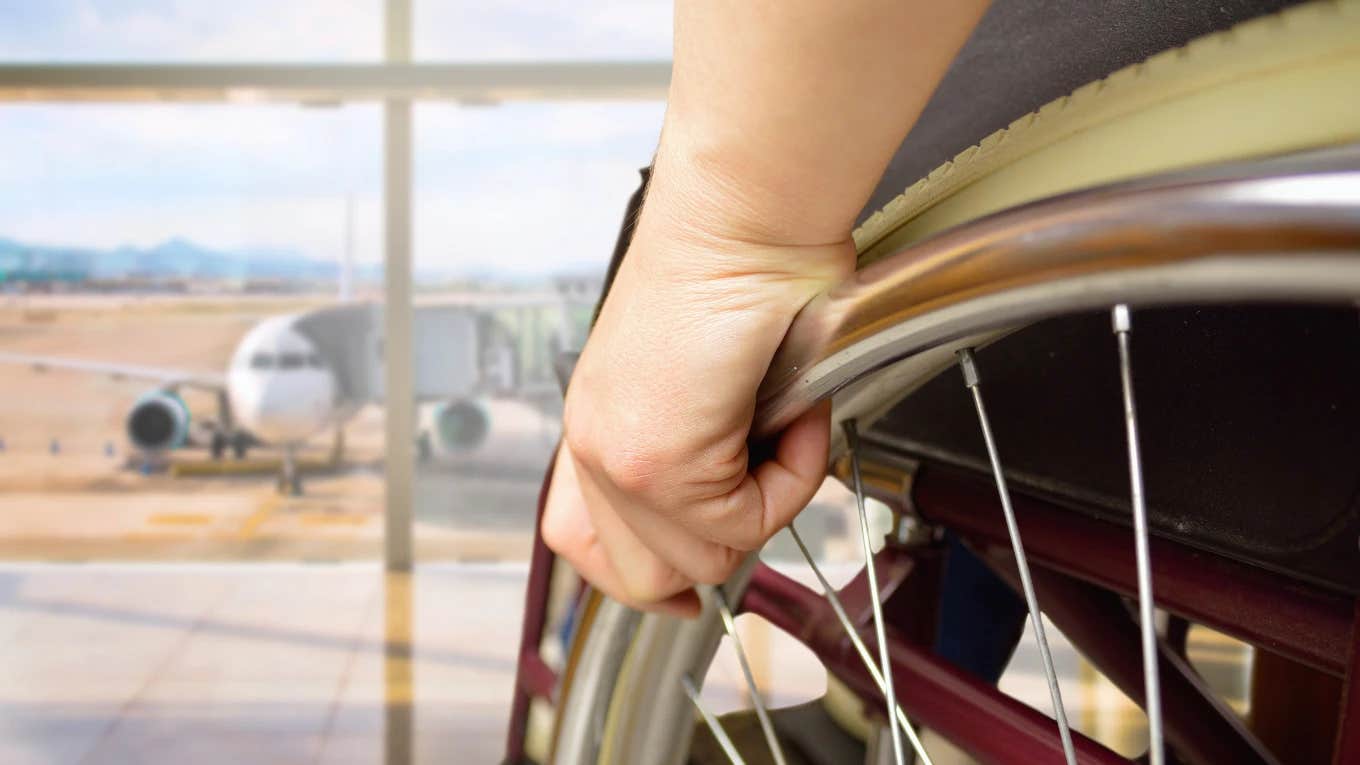Woman Criticizes How Airline Employees Carried Her Wheelchair Off The Plane — But People Think She's Wrong
Many felt she was expecting too much from workers in such a small country. But was she really?
 Cunaplus_M.Faba / Getty Images Canva Pro
Cunaplus_M.Faba / Getty Images Canva Pro Even in the most progressive places with the most resources, accessibility is often lacking for people with disabilities. Air travel is frequently a difficult undertaking for those who rely on wheelchairs and other mobility aids.
One woman who relies on a wheelchair said her recent airplane trip was so lacking in basic accommodations it left her not only furious but terrified. However, her post about her experience left many people feeling that she was asking too much.
The woman was furious about how airline employees handled her wheelchair after a flight to Costa Rica.
Unfortunately, it is incredibly common for disabled people to have their wheelchairs damaged, sometimes irreparably, by airlines — and sometimes they're lost altogether.
The U.S. Department of Transportation found that airlines lost 11,527 wheelchairs in 2023. The problem is growing so fast that the agency has proposed legislation that would fine airlines that lose or damage wheelchairs, among other regulations.
But what happened to disabled travel blogger and TikToker Tori Hunter was arguably worse.
Hunter has a condition called spinal muscular atrophy and uses social media to share her experiences traveling all over the world as a person who depends on a wheelchair. Her recent voyage to Costa Rica left her "absolutely terrified."
Hunter was carried down the plane's steps in a broken airplane wheelchair by the flight crew in a way she said was unsafe.
"This is me, being carried down a flight of stairs in a broken aisle chair," Hunter wrote in the caption of her video. An aisle chair is a wheelchair that airlines use to board and deplane disabled people that is specially designed to fit down the narrow aisles of planes.
But the one used for Hunter was broken. She said it had "no armrests, straps that wouldn’t tighten enough to keep my body in, and front wheels that were busted off."
Even worse, her plane did not use a jet bridge but rather stairs down to the tarmac, which meant Hunter had to be carried by airline staff in the aisle chair. "You can see from my face how distraught and absolutely terrified I was," she wrote, explaining that the employees obviously had "very little training" in how to do so properly.
They kept losing their grip and holding the chair at odd angles, which resulted in Hunter's head bobbing to the side and her feeling unsafe. "We didn’t speak the same language so they continued along without understanding my repeated 'no's,'" she went on to say. "Never in my life have I felt so out of control and so disconnected from my body."
Making her even angrier was the fact that the airport was equipped with jet bridges, and hers was the only flight disembarking that was not using one. "It’s 2024," she said, "disabled people deserve a more dignified and safe way to fly."
Hunter got a lot of blowback from people who felt she was unappreciative of the effort the employees put forth.
Hunter's video incited a wave of sometimes angry criticism from people who felt she was expecting far too much, especially at a small airport in a small country with fewer resources than places like the United States.
"I see nice people trying to help," one commenter wrote. "They were so nice and gentle," another added. "They did their best with what was provided for them."
One commenter explained that Liberia, the city where Hunter landed, "is the smallest airport in Costa Rica, in the middle of a very rural zone." The commenter added, "I wish that it was a place that could afford that kind of accessibility."
Some seemed downright angry at Hunter and implied she was some sort of "Karen" needlessly protesting. "People will always complain," one person sniped. Another told Hunter to "be grateful they were there to help you," implying that what Hunter should have expected was to be forced to simply fend for herself.
Hunter's point was that ableism and a lack of accessibility affect far more than just disabled people.
In a follow-up video responding to a critical comment, Hunter explained that her intent was not to "point fingers" at the crew but rather to point out that they should not have been put in such a position either.
There are myriad ways this situation could have resulted in injuries not just to Hunter but to the staff, too, of course. As she put it, "This wasn't only unsafe for me, but it was unsafe for them. It wasn't just about me."
And missing from the commentary, she said, is that the incident speaks to "a bigger systemic issue" — namely, the way not prioritizing accessibility puts everyone involved at risk, not just disabled people.
"We've probably all seen the videos of airlines that now have queen-size beds and they have showers in them and they have entire bars in the middle of the aircraft," she said.
"It's 2024, and they can make those changes, but they can't make sure that people with disabilities can actually board and get off the plane in a dignified and safe way, not only for that passenger but also for their staff."
Hopefully, Hunter's situation will help others see the light because her experience seems like one that could have easily gone sideways for everyone involved. And at a time of record profits for airlines, there's really no excuse.
John Sundholm is a news and entertainment writer who covers pop culture, social justice, and human interest topics.

